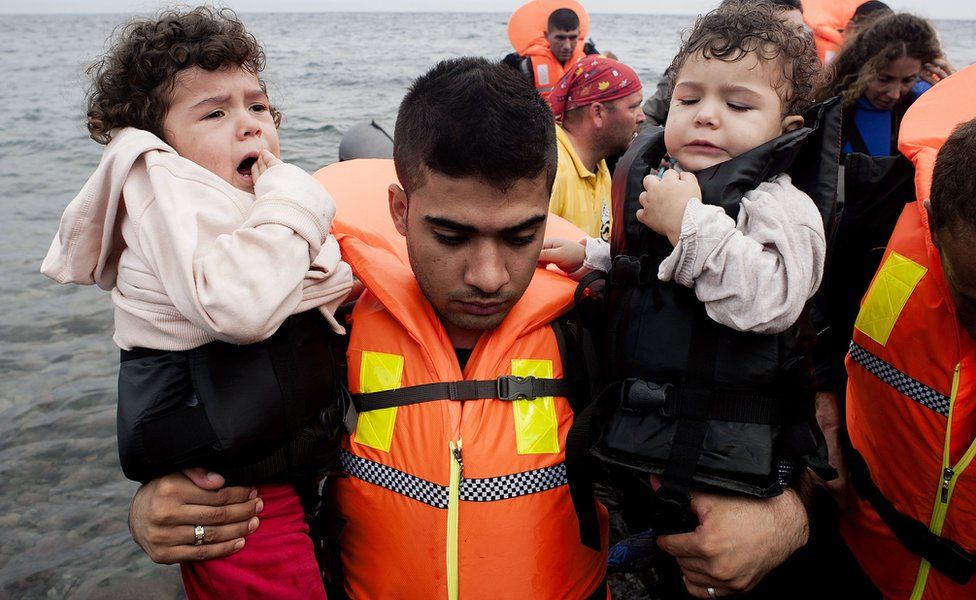Migrant crisis: EU ministers approve disputed quota plan
- Published

EU interior ministers have approved a controversial plan to relocate 120,000 migrants across the continent over the next two years.
It will see migrants moved from Italy, Greece and Hungary to other EU countries.
Romania, the Czech Republic, Slovakia and Hungary voted against accepting mandatory quotas.
After the vote, Slovakia's prime minister said he would not accept the new quotas.
Finland abstained from the vote. Poland, which had opposed the proposal, voted for it.
The BBC's Europe correspondent Chris Morris says it is highly unusual for an issue like this - which involves national sovereignty - to be decided by majority vote rather than unanimous decision.
The matter must now be ratified by EU leaders in Brussels on Wednesday.
Who are the 120,000?
- All are migrants "in clear need of international protection" to be resettled from Italy, Greece, Hungary to other EU member states
- 15,600 from Italy, 50,400 from Greece, 54,000 from Hungary, though it is unclear how many are still in Hungary
- Initial screening of asylum applicants carried out in Greece, Hungary and Italy
- Syrians, Eritreans, Iraqis prioritised
- Financial penalty of 0.002% of GDP for those member countries refusing to accept relocated migrants
- Relocation to accepting countries depends on size of economy and population, average number of asylum applications
- Transfer of individual applicants within two months
Source: European Commission
Earlier in the day, the Czech government warned that the plan was unlikely to work, even if it gained approval.
The UN refugee agency said the scheme would be insufficient, given the large numbers arriving in Europe.
"A relocation programme alone, at this stage in the crisis, will not be enough to stabilise the situation," , UNHCR spokeswoman Melissa Fleming said.
The number of those needing relocation will probably have to be revised upwards significantly, she said.
Croatia's interior minister says there is 'no possibility' to stop people arriving
The UN says close to 480,000 migrants have arrived in Europe by sea this year, and are now reaching European shores at a rate of nearly 6,000 a day.
Under the EU's constitution, a country that does not agree with a policy on migration imposed upon it could have the right to appeal to the European Council - if it feels "the fundamental principles of its social security or legal system are under threat".
None of the countries that voted against the plan has yet indicated whether it would appeal.
A crisis like no other - Chris Morris, BBC News, Brussels
Criticism is already ringing out from countries that voted against the relocation scheme, but under EU law they are now obliged to take part. It is highly unusual - unprecedented, really - for a majority vote to be used in a situation like this, which involves basic issues of national sovereignty.
But the European Commission says it is determined to enforce what was agreed. What's not yet clear is what will happen if any country simply refuses to comply - and that has certainly been the suggestion from some capitals.
Will financial sanctions be sufficient? It is another sign that this crisis is testing European unity like no other.
'Emperor has no clothes'
Luxembourg's Foreign Minister Jean Asselborn, who chaired the meeting, said he had "no doubt" opposing countries would implement the measures.
But Slovakia's Prime Minister Robert Fico said he would not implement the quotas as long as he was in office.
Czech Interior Minister Milan Chovanec tweeted: "Very soon we will realise the emperor has no clothes. Today was a defeat for common sense."
After the meeting, German Interior Minister Thomas de Maiziere said: "Today is an important building block, but no more than that."
A statement from the European Commission said foreign ministers would now discuss reforms to the Dublin regulation, which demands that migrants register as refugees in the first EU country in which they arrive.
The UK has opted against taking part in the relocation scheme and has its own plan to resettle migrants directly from Syrian refugee camps.
A note on terminology: The BBC uses the term migrant to refer to all people on the move who have yet to complete the legal process of claiming asylum. This group includes people fleeing war-torn countries such as Syria, who are likely to be granted refugee status, as well as people who are seeking jobs and better lives, who governments are likely to rule are economic migrants.